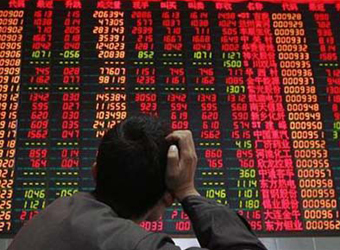Asian shares tottered on Wednesday, extending losses after consumer inflation in China eased more than expected and heightened concerns about deflationary pressures in the world’s second-largest economy.
The downbeat mood was expected to continue into European trading, with financial spreadbetters calling Britain’s FTSE 100 .FTSE to open down by as much as 1.0 percent. Germany’s DAX .GDAXI was seen opening as much as 0.7 percent lower, while France’s CAC 40 .FCHI was seen down 0.8 percent.
“This weakness looks set to translate into a weaker European open this morning as investors, already concerned about Chinese growth, saw German ZEW economic sentiment expectations hit a one-year low,” wrote Michael Hewson at CMC Markets in London.
The ZEW figures were released on Tuesday.
China’s consumer price index (CPI) rose 1.6 percent in September from a year earlier, the National Bureau of Statistics(NBS) said, falling short of expectations of 1.8 percent and down from August’s 2.0 percent.
Earlier on Wednesday, the Monetary Authority of Singapore (MAS) said that it will ease its monetary policy for the second time this year by slowing the pace of the Singapore dollar’s appreciation. The move was aimed at reviving an economy that narrowly avoided a recession in the third quarter.
MSCI’s broadest index of Asia-Pacific shares outside Japan .MIAPJ0000PUS was down 0.6 percent in afternoon trade, while Japan’s Nikkei stock index .N225 ended down 1.9 percent.
Chinese shares were also lower, with the blue-chip CSI300 index .CSI300 down 0.9 percent and the Shanghai Composite Index .SSEC losing 0.8 percent.
Australian shares also extended losses after the Chinese price figures, reflecting China’s importance as Australia’s main trading partner, though the fall later was pared. The S&P/ASX 200 index ended down 0.1 percent.
On Wall Street on Tuesday, stocks dropped, with the S&P 500 SPX touching a fresh seven-week high but ending solidly down. S&P 500 e-mini futures ESc1 were down slightly in Asian trading, off session lows touched in the wake of the China price figures.
Stocks have been underpinned in recent weeks after the U.S. Federal Reserve last month held off on raising interest rates for the first time since 2006. But a main reason for the Fed’s hesitation continued to worry investors, as American policymakers fretted that a global economic slowdown might threaten the U.S. economic outlook.
The U.S. central bank will hold just two more policy meetings in 2015, on Oct. 27-28 and Dec. 15-16, with expectations fading that the Fed will deliver a hike this year. [FED/DIARY]
The yield on benchmark 10-year Treasuries US10YT=RR slipped to 2.042 percent in Asian trading from the U.S. close of 2.055 percent on Tuesday.
Crude oil prices took back some ground lost overnight but remained under pressure after the International Energy Agency rekindled fears that the market would remain over-supplied for at least another year despite falls in output from non-OPEC producers.
“We are still in oversupply,” said Daniel Ang, an investment analyst at Phillip Futures Pte Ltd.
Brent LCOc1 was up about 0.2 percent at $49.32 per barrel, after skidding 1.24 percent in the previous session. U.S. crude CLc1 edged up about 0.2 percent to $46.75 per barrel after losing 0.9 percent overnight.
A weaker dollar did not give much help to commodity prices.
The dollar index .DXY, which tracks the greenback against a basket of six peers, was down about 0.1 percent on Wednesday at 94.645, after falling as low as 94.539 on Tuesday, its lowest since Sept 18.
The dollar was about 0.1 percent lower against the yen at 119.66 yen JPY=, while the euro added about 0.2 percent to buy $1.1396 EUR= after rising to a 3 1/2-week high of $1.1411 overnight.
The Singapore dollar SGD=D3 rose as much as 0.9 percent to 1.3904 against the U.S. dollar, its strongest since Sept. 18, after the MAS easing decision.
Source: Reuters


